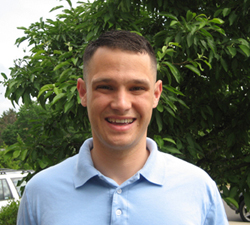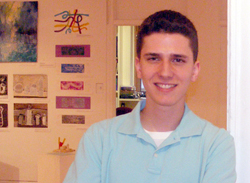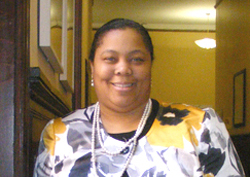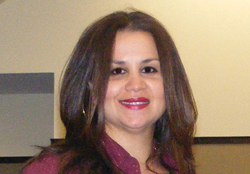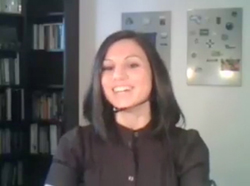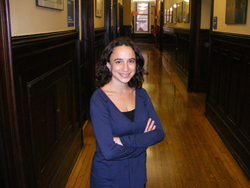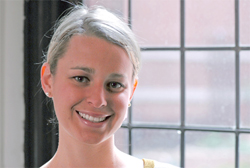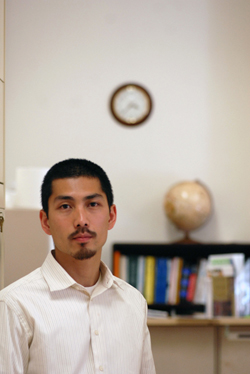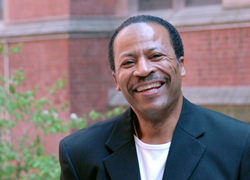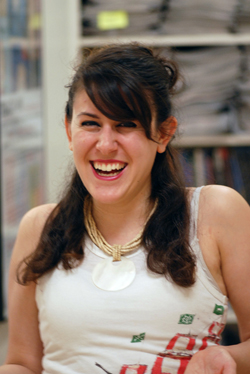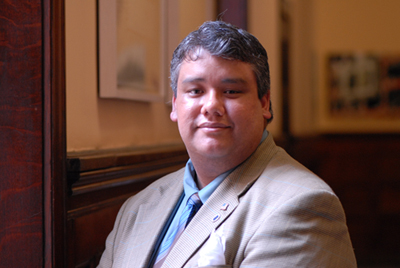Meet Our Graduates!
A sampling of TC's diverse and diversely talented graduating class, in their own words
Science Education
Luis Alicea was born in Puerto Rico and grew up in New York City
I student taught at two locations. I taught at Millennial High School downtown, which is a Gates Foundation-sponsored school, and then I taught Dr. Mary E. Walker Medical Science Academy, which is located at the Bronx High School
Diana Alutto, M.A.,

Elementary Education
Diana Alutto was a performer and fashion designer before deciding to pursue teaching.
I went to Pace University , in downtown Manhattan
I went to Disney World when I was in college to do a performance internship. I was a dancer and a performer there. And Disney World is just all kids, all the time. I also did work as a fashion designer for several years in between college and graduate school.
My first semester student teaching, I was at Wagner Middle School 76th Street Upper East Side community, very, very different experiences.
I learned so much from those students, as much as they learned from me. I learned so much about myself. What they did for me was really incredible. So I want to continue that experience, and I feel the best place to do that is New York City
Clarence Cooper, Ed.D., 

Curriculum and Teaching
Clarence Cooper co-founded a small high school and his dissertation examined effective teaching strategies used by teachers at the school.
I felt that the 1960s was a period in my life that helped me to mature probably much faster than I would have if I hadn’t had those experience growing up. It made also coming to a school like TC something that was part of what I should be doing. If you want to be excellent, you go to the best. If you want to excel, you have to go to a place where they’re going to put demands on you. And you can’t quit. You just have to do it. And you can do it. So in many ways what I went through as a youngster growing up and maturing was part of the story of who I became as an adult and later a teacher. And it’s something that I live by as a teacher.
I’m primarily an administrator now, but I work with kids, and I tell them all the time, there’s only one person in this world you control, and that’s yourself. You can do whatever you want to do if you choose to. Somewhere along the way you’ll need help. Somewhere you’ll need some support. But you can do it. It may not be easy, but you certainly can. I’ve lived that, and I believe it.
Daisuke Funai, M.A., 

International Educational Development
Daisuke Funai was born in Japan and grew up in New York City and Los Angeles Japan
“Ever since senior year of college, I have been working in various capacities and diverse settings to improve educational access and experiences for students of all ages. I worked as an academic advisor in a charter school in Oakland ; then I worked internationally in Japan teaching English and at a human rights organization in Mexico City New York City , where I served as the Writing Program Director for a nonprofit college-prep organization committed to expanding educational opportunities for students from New York City
When I came to Teachers College, I was hoping to move my career towards organizations that were more international in scope, and this program in International Educational Development really fit my career interests. I found that the colleagues, professors and students came from just as unique and rich backgrounds as I did, which provided for a very enriching experience. I think our program, International Educational Development, is great because it prepares us to work within an array of different organizations, from multilateral agencies to local nonprofits.
There was also enough flexibility in the program to allow for us to take on different specializations. In the Language, Literacy and Technology program, I was allowed to take on a multidisciplinary course load, taking most of my electives in the Math, Science and Technology Department.”
Ashley Gleitman, M.A.,

Health and Behavioral Studies
Ashley Gleitman has combined her interest in journalism and technology with a passion for health education.
While studying journalism in undergraduate school, I did an interdisciplinary internship in Cape Town , South Africa
At TC, I was fortunate enough to receive a fellowship to study disparities in health care under Dr. Barbara Wallace. I was able to work on her project studying local and global capacity building for HIV prevention. Dr. Wallace told me she wrote a manual to teach people to become peer educators in HIV prevention, and she asked me where I could see implementing this program. It didn’t take me very long to realize that my college roommate, who is a current Peace Corps volunteer, had just recently opened a clinic in Togo , in West Africa . She told me they needed an educational program. I thought this was too serendipitous not to collaborate. That is what turned into my master’s project and what I can say is my most proud achievement. And that would have never happened without the collaboration with Dr. Wallace and the other doctoral students who did similar work in India , Jamaica and Haiti
Sara Inbar, M.A.,
Curriculum and Teaching
Sara Inbar began her professional life as an actor, working on Broadway before pursuing a teaching career.
Right out of college, I started working on Broadway. I did two shows. I did Mamma Mia for two years, and then I did Spelling Bee for two years. I did it in San Francisco , Boston and New York
My original plan was to teach for 10 years and then come back and do an international type of degree and start thinking about curriculum planning around the world, not just here [in the U.S.]. But I think we have significant progress to make here. You can start in the classroom, but I think there are serious systemic issues that need to be addressed. I’m definitely committed to addressing those in any way I can, within and outside of the classroom. I think curriculum needs to be completely rethought. I could definitely see a second go round as a curriculum planner.
Stavroula Kontovourki, Ed.D.,

Curriculum and Teaching
Stavroula Kontovourki, a native of Cyprus
The person who most influenced my whole experience at Teachers College is my advisor and dissertation sponsor, Marjorie Siegel. I met her in the first year, and I was very intrigued by the way that she was presenting the whole issue of literacy, and who is literate, and how literacy is defined, and who gets to be defined as literate. That’s what drew me to continuing my studies on literacy. So for the past five years, I’ve worked closely with her. I volunteered for research she was conducting during my first year at Teachers College, and then I worked as her Research Assistant for three years.
Now, it feels like it’s a collaboration between equal parts: a friendship and mentorship relationship. I feel like she was the one who gave me the most opportunities to learn the theory behind the practice that I was interested in. She was the one who challenged me to see the gaps or the limitations in my work and made me rethink what I was doing and how I was doing it.
Angela Livingston, M.S.,

Speech and Language Pathology
Angela Livingston decided to pursue a career as a speech pathologists after her son was diagnosed with a speech impediment.
I’ve had to work full-time, all the time. I’ve always been a working person and have gone to school part-time. Sleep has been an almost an absent thing in my life for almost 11 years because when you have to be at work from 9 to 5 and then go to class and then prepare reports for work, for school, you get very little sleep. And then you have your family responsibilities, too. I have to cook. I have to clean. I have mountains of laundry to do. So I have had to be so disciplined and so focused to be able to do the things that are important to me.
I became interested in speech pathology because of my son’s speech delay. He, gladly, overcame it because of the beautiful work that speech pathologists do. That created the interest in me to find out all about it. I found out that there’s such a high need for bilingual speech pathologists, and not just Spanish/English, but for all types of people from all walks of life with different languages.
To me, [getting a master’s degree] doesn’t just represent getting an education. This represents the fulfillment of a dream. It’s taken me 11 years of a lot of sacrifice to get here, and I’m very grateful for a lot of things, for having the stamina and the energy and the support of my family. This truly represents a dream come true.
Roberta Newton, Ed.D.,

Curriculum and Teaching
Roberta Newton spent 10 years as a bilingual teacher in California
I was always interested in TC’s commitment to education and, specifically, diversity in urban education. When I first graduated from college, I visited TC, and I decided that whenever I decided to get another degree that I would come to TC. So I taught for 10 years and then I said, “I’m ready to go back to school.” I only applied to TC. I came for my master’s and then stayed on for the doctoral program.
My dissertation is on the racialized experiences of student teachers of color at a predominantly white institution. I used an arts-informed methodology because I really wanted to look at how we could use art, specifically poetry and collage, as a way to understand the experiences of student teachers of color as they journey through their entire program. I remember when I told [the late TC Professor] Leslie Williams that I wanted to do an arts-informed dissertation, she said, “Okay. Well, you know, I don’t know much about that, but we’ll learn about that together.” I think that is the ultimate scholar—someone who always wants to keep learning. Leslie had been a professor 20 or 30 years, and she was like, “Oh, I want to learn about that.” I think that that’s the spirit with which she engaged her students at all times. I remember that as a landmark experience for me.
Eric Oberstein, M.A., 

Arts Administration
Eric Oberstein served as assistant director of the Afro Latin Jazz Orchestra while a student at TC.
I was very impressed with just the level of knowledge and passion among the students here, among my classmates. I really was the young statesman here in my program—the youngest member of my class. It was a privilege and an honor for me to work every day with students who had lots of experience and different perspectives from across the arts. Even more so than my classes, these colleagues were really my education.
In regard to Teachers College, I think it’s an amazingly warm institution with a lot of amazing things going on. Given my interest not just in arts administration, but also in education and art education, it was really a thrill to see other projects that were going on at Teachers College on an ongoing basis and to be around such amazing professors and students as well. So I think it turned out to be the perfect place for me. I think that it’s a great launching pad for me as I continue my education and my career, and being a part of the broader Columbia Columbia
Adam Sawyer, M.A., 

Organizational Psychology and Leadership
Adam Sawyer is an Iraq War veteran who came to TC as part of unique program between West Point and the College.
I am a major in the United States Army. I’m part of the Eisenhower Leader Development program [at] West Point and Teachers College. I did one tour in Iraq West Point and work with cadets to do the same thing and prepare them to become young junior officers in the U.S. Army. This degree was kind of necessary for that kind of job, and I was more than happy to do a master’s degree here at Teachers College.
I fell in love with the program down here. It’s an excellent, phenomenal program. It really enabled me to look at my 15 months in Iraq
I think this program is starting to gain popularity in the Army. Word is getting out, and it’s getting more popular, and more people are applying. In five to 10 years, when my peers and I are battalion-level commanders and brigade-level commanders, if we are lucky enough, that’s when we [will] have the ability to influence and put some of these things we learned into action.
To view the full-length video interviews of these graduates and more, visit www.tc.edu/news/article.htm?id=6998.
Published Monday, Jun. 22, 2009

